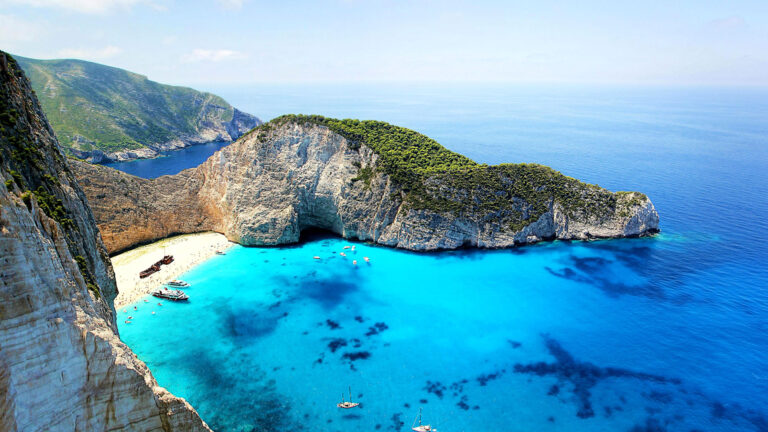
If you need a freelance travel writer or you would like to see your country, city, flight, etc., presented on the blog, drop me an email.
Find our more on Freelance Travel Writer page.
If you go north from Amman, as I did, you will get to Jerash ruins which are not to be missed when you travel to Jordan. This is one of the most important historical places in Jordan, one of the most significant Roman cities in the region that is well preserved to this day. So, prepare yourself for the incredible city of Jerash.
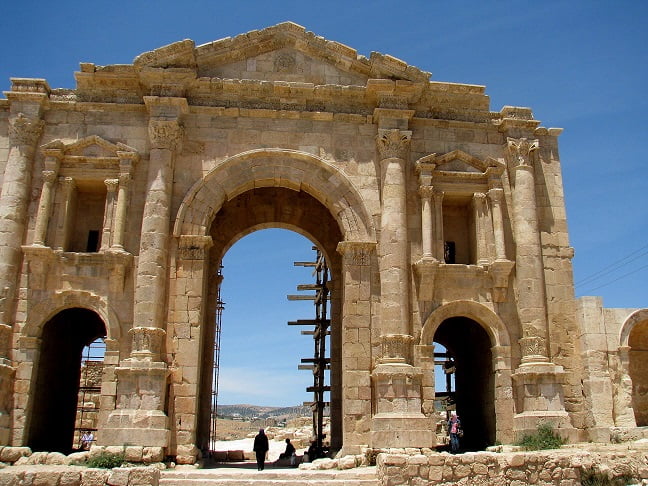
The formal town plan first laid down around 70 AD reflected the typical Roman scheme of a main colonnaded street intersected by smaller side streets. When Emperor Trajan occupied all of Jordan in 106 AD, Jerash (or Gerasa) fell under the jurisdiction of the new Roman province of Arabia. As local investments in agriculture, industry and services boosted regional and international trade, Jerash and the whole country, enjoyed the golden age for over 200 years.
One can sense Gerasa’s prosperity even before reaching the modern entrance and the South Gate.
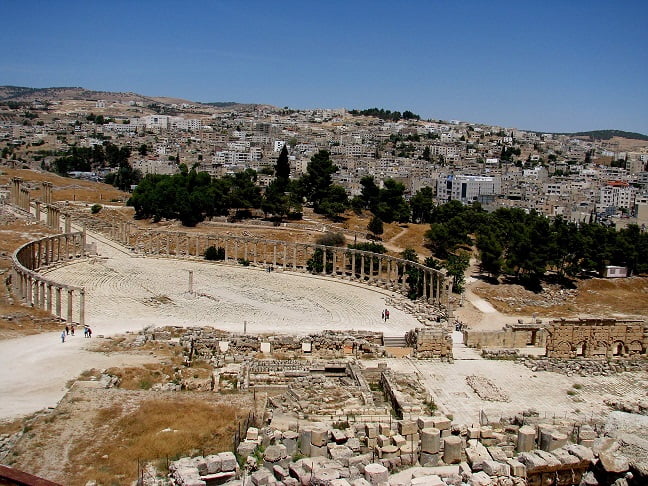
The first monument one encounters on the road from Amman is the triple-gated Hadrian Arch, standing about 450 meters south of the city walls and built to commemorate Emperor Hadrian’s visit to Gerasa in 129 AD… I read this in the guidebook I bought in Amman, but let me tell you – you will get overwhelmed by the first glimpse of the city once you get here.
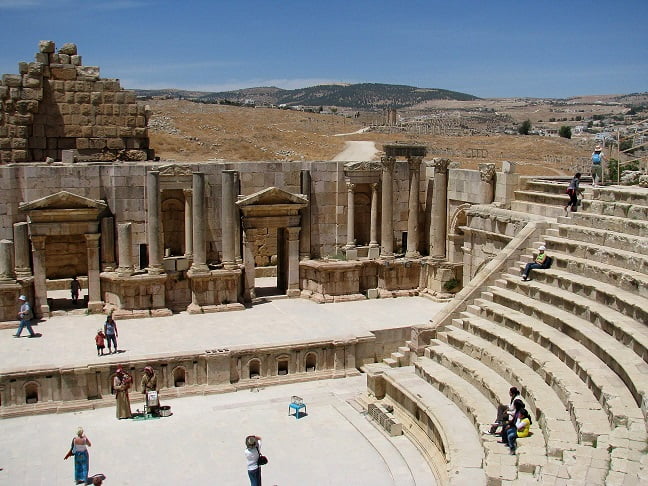
The Arch stands next to the massive Hippodrome where the south part is restored still housing some of the Roman games for tourism purposes. The Hippodrome was built between the 1st and the 3rd century AD, and it could have accommodated up to 5,000 spectators.
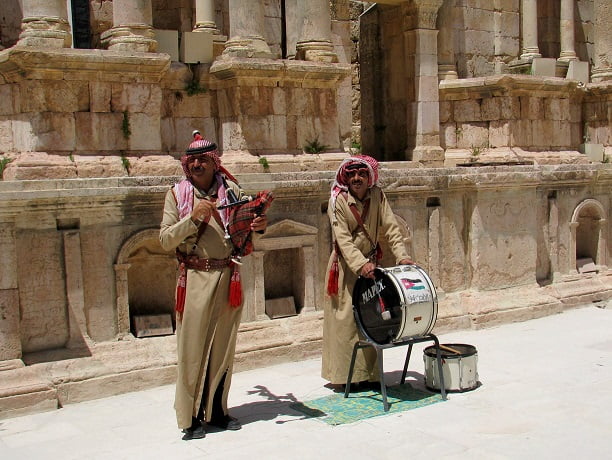
The South Gate leads visitors into the spacious Oval Plaza with its long arcade of Ionic columns. Overlooking the plaza from the west is the 1st-century Temple of Jupiter whose Hellenistic predecessor was uncovered in its lower courtyard. When you get to the temple, you will have a great view of the whole Oval Plaza. West of the temple is the large South Theater, finished in the early 2nd century AD.
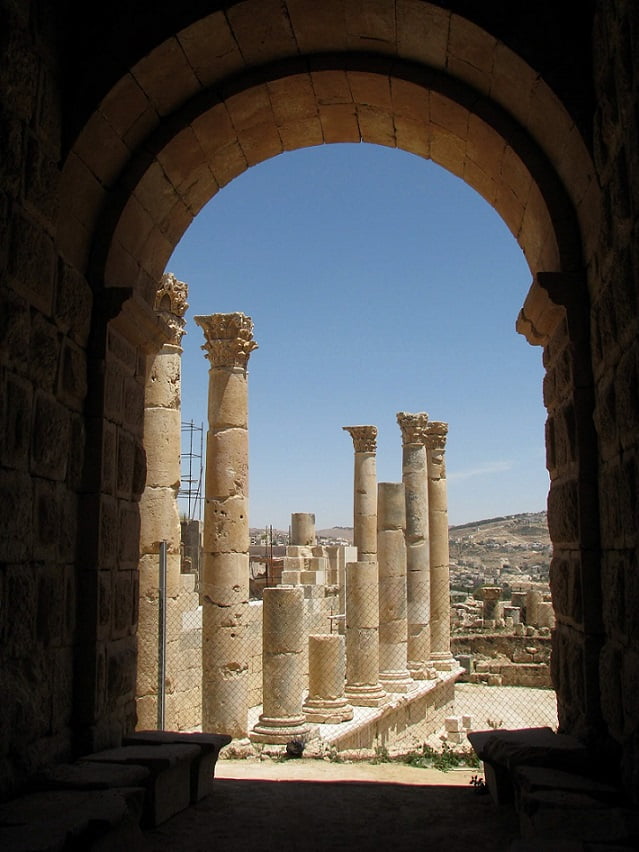
The Oval Plaza leads into the 800-meter-long Cardo, the main street and the urban spine of ancient Gerasa. In the 2nd century AD, the original Cardo was widened and its original Ionic columns were replaced by the more elaborate Corinthian style. You can still see the 56 imposing columns.
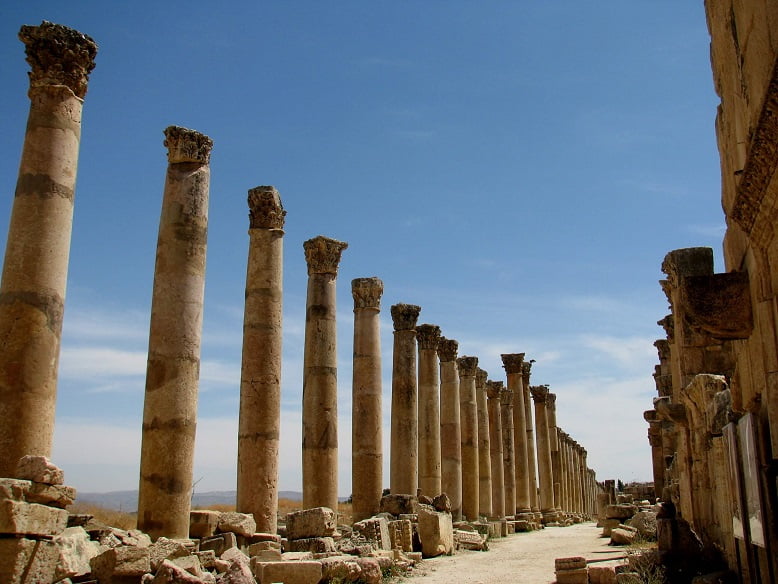
The Jerash ruins are even more spectacular thanks to the broad paved street, the main artery of the city, called the Cardo Maximus. It was once flanked by porticoes of which over 500 columns still exist. You can almost imagine heavy carriages riding by, and hearing the conversation of people passing by, or haggling and buying goods.
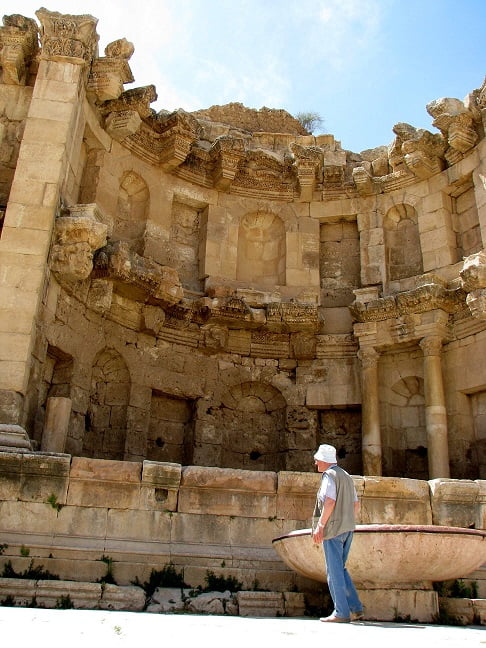
The city’s most important structures, arranged around the first Cardo I have mentioned, also included markets, temples, and fountains. Walking up the street today from south to north, you will pass a string of public monuments, some of which retain the crisply carved stonework of the 2nd century AD, such as the Agora, the Forum (where official business was transacted), the richly carved entrance to a Roman temple which was transformed into a church, the Nymphaeum or ornate public fountain, the Temple of Artemis who was the patron goddess of the city (the remaining columns are stunning!), the wide West Baths, the North Colonnaded street leading to the North Gate, etc.
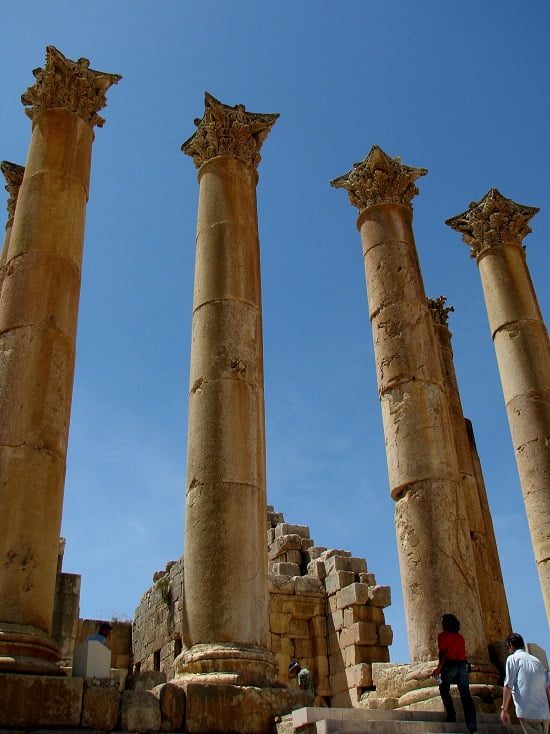
In the Byzantine era, some of Gerasa’s Roman temples were transformed into Christian churches, while new churches were built from cut stones and columns taken from Roman-era buildings that had collapsed from frequent earthquakes in antiquity. We now know of at least 15 churches in Byzantine Gerasa.
The complex of three churches dedicated to Saint George, Saint John, and saints Cosmas and Damian, west of the Artemis Temple, has the city’s best-preserved mosaics from the 6th century AD, including representations of animals and the church benefactors and bishops.
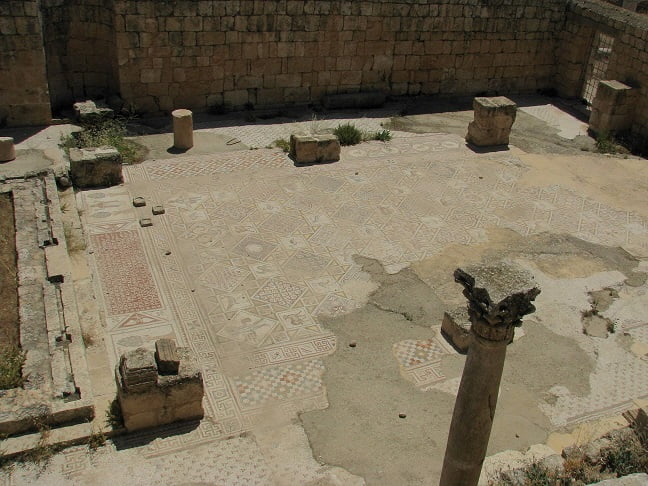
Although I already mentioned a few Jordanian dishes you should try while visiting the country, I have to say that I will also remember Jerash ruins because of the Arabic pita bread I tried in the nearby restaurant. It was extremely tasty, crunchy, and sprinkled with seeds. If going around the ancient Gerasa in the sun got you hungry, don’t worry, the refreshment and delicious food are not very far.
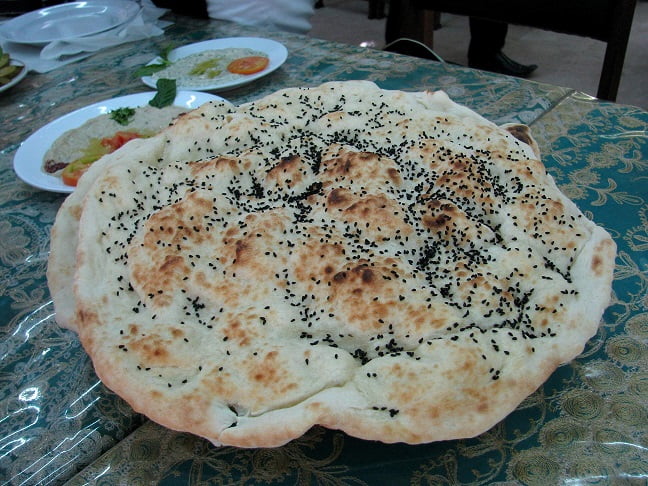
And then, in less than an hour’s ride from Jerash ruins, you will reach the border with Syria. It will take you the same time to get to the capital Amman from here. As for my travelogue, I think it’s time to head south, to the shores of the Red Sea.
Next: AQABA VACATION (7)
The full Jordan SERIES
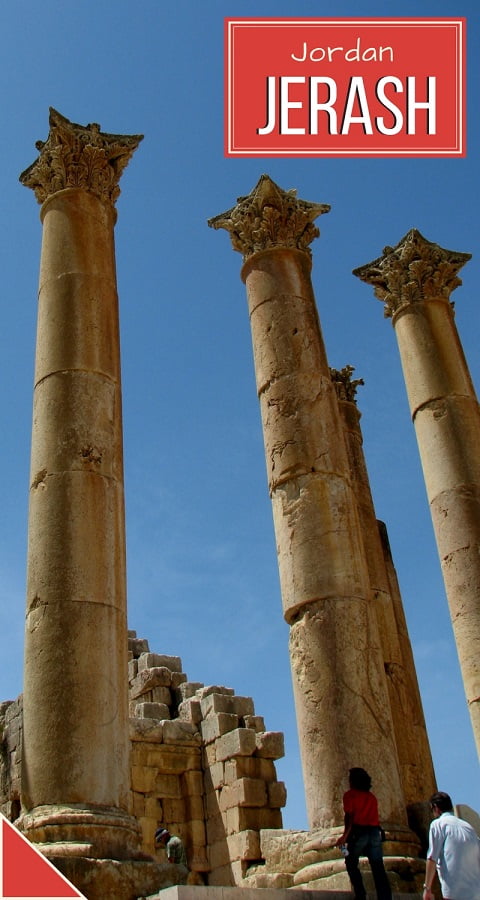
If you need a freelance travel writer or you would like to see your country, city, flight, etc., presented on the blog, drop me an email.
Find our more on Freelance Travel Writer page.
I am looking forward to working with you.




20 responses
Holy Roman Empire! The more I read about Jordan the more I want to bump it up my travel Bucket List cause the whole country amazes me. I have never heard of Jerash but your photos of this former roman city just look absolutely amazing to me! Hadrian’s Arch, the Theater, all of it, just look like you fall back in time.
Hehehe, you’ll learn a lot about the country. There’s one more post in the series, I promise! 😀
Joking aside, this town really is amazing, greatly preserved and it shows how important the region was for ancient Romans. I was stunned by the immensity of the whole town area!
I visited Jerash about 4 years ago from Amman and it’s one of my favourite historical sites in the world, not just in Jordan. You’ve given a lot of details about the place and it’s history- that’s really informative, thanks! Your pictures are amazing 🙂
Thank you! So glad I’ve met another Jordan fan. 😉
Jerash was my absolute favourite place we visited in Jordan, it just blew me away, not least because I had not heard of it before our visit (it was not one I did the research and planning for) and we had it virtually to ourselves (because we visited at a volatile time in the region and most others cancelled their visits, so there were next to no travellers there). It was such an impressive site, I’d actually love to go back and explore it further. This stretch of journey you have described it one that all who love ancient history and sites should do!!!
I was fortunate enough to visit while it wasn’t very crowded as well.
No wonder you were blown away, it really is stunning to see this all in person. 🙂
Jordan has been on the top of our bucket list forever! The culture is fascinating and because I love history I already know I’d love it. We’re used to see Roman cities in Italy but to see one in another country is always incredible! I can well imagine how one might feel overwelmed by the city views!
Oh well, if you love history, as I do, I’m sure you’d love Jerash! You can almost feel the ancient city’s atmosphere by walking the main cobblestone street among all those columns. 🙂
Thanks for this introduction to Jerash – not a part of Jordan I had heard of. But wow, what a way to travel back into ancient Roman times! The triple-gated Hadrian Arch looks incredible, as do the 500 remaining columns at Cardo Maximus. I would feel like I had been transported back through time walking those ancient streets!
The stonework in the region is so incredible, and I’m amazed at how well preserved the city is. What an epic experience, thankyou for the tour!
Jerash is often overlooked by tourists. Not having enough time for sight-seeing, people usually rush to Petra and the Dead Sea and then leave.
But there really is so much more to the country! I was lucky to have been able to visit numerous times. 🙂
I am so happy to read about Jerash. It is my most favorite place in Jordan. I liked it even better than Petra – probably because we hear so much about Petra and Jerash came out as a total surprise. It was a very hot and dry day and I was not even carrying water but I still walked around the whole site. Given a chance, I would love to go back and watch a performance in that theater.
So true, Jerash does come as a surprise when visiting Jordan.
I can totally relate to your visit. When I was there, it was terribly hot and dry as well. But one soon forgets about all that the moment he passes through the South Gate. 🙂
Loved your photos of Jordan. It’s been on my bucket list for a long time. It’s so amazing that the Hippodrome is still standing relatively unscathed. That pita bread looks like a great snack after a long day.
Thank you! Well, if you ever decide to go, you will find all the things to see and do in Jordan in this series. 😉
These days I am reading much about Jordan and every time i read a article on it my urge to visit this beautiful ancient land increases. Jerash looks like a wonderland. The 500 columns street looks amazing. The size of Arabic bread is huge and it looks yumm too. I would love to see all this in person someday for sure.
When you go to Jordan, try not to rush. You will miss a lot if you just go to Petra.
Well, it’s obvious why. 😀
Roman history and architecture have always been a source of great fascination for us. We loved it as we roamed among the Roman ruins of the Colosseum and other monuments in Rome. Jerash evokes memories of Rome. The same columns and the same grandiose architecture. Definitely, a visit here is on the cards.
This is such a reminder that this ancient city was also a part of the Roman Empire once. Magnificent monument, you’d love it. 🙂
Jerash looks so similar to Ephesus from turkey.. I love exploring such towns and the history that you’ve written about is amazing.. I’m sure it must have been a great experience.. I’ll definitely go here whenever I get to visit Jordan..
Oh yes, similar to Ephesus, but to Palmyra in Syria as well and all those Roman ancient cities in the region.
Would love to hear your impressions when you come back. 🙂